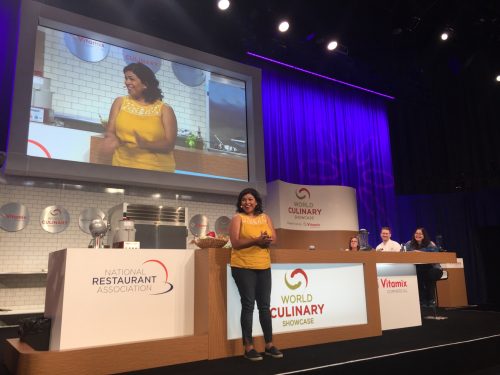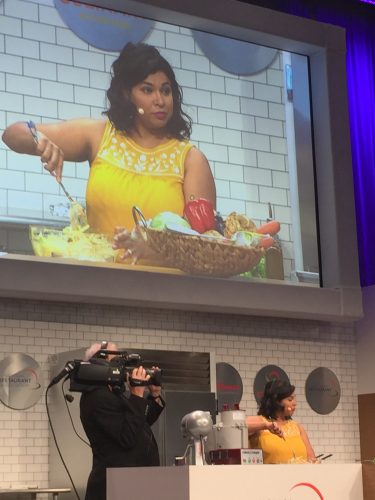Food Network’s Aarti Sequeria of “Aarti Party” cooked up an Indian-inspired storm at the National Restaurant Association Show in Chicago, IL.

As she seamlessly assembled Indian dry-rubbed ribs and a yogurt-based cabbage slaw, an audience member asked about where dairy fits in Indian cuisine. Dairy doesn’t immediately come to mind with Indian food, but Aarti had a lot of examples.
In this blog post, you’ll learn about:
- The five spices to stock your pantry with.
- Dairy’s role in Indian cuisine.
- Indian-inspired recipes.
Aarti’s 5 Spices: What Your Pantry Needs
When pursuing a new cuisine, you need the basics. For Aarti, she called out five key spices to purchase:
- Coriander: Coriander seeds are planted to grow cilantro! Coriander’s antioxidant levels may help reduce inflammation.
- Cumin: With an earthy and nutty flavor, cumin pairs well with chickpeas, rice, vegetables, and yogurt.
- Garam Masala: The spice is actually a mixture of many spices. For Aarti, she blends together cinnamon, cloves, and cardamom.
- Paprika: Containing capsaicin, the phytochemical that makes peppers hot is also good for your heart! Aarti noted that hot capsaicin makes you eat less, and slightly revs metabolism. Don’t expect to lose weight by adding paprika, but you may eat less food overall because of the increased heat.
- Turmeric (curcumin): Bright yellowish-orange, turmeric provides color to some butters, cheeses, and Indian curry. Curcumin contains antioxidants and is used in Ayurvedic medicine as an anti-inflammatory to treat digestive and liver problems. Researchers continue to study these topics.
Rather than feel overwhelmed, begin with these basics. Aarti mentioned that many Indian recipes use a mixture of the above spices.
She spoke to the spices being used throughout Ayurvedic medicine, which the National Institutes of Health, National Center for Complementary and Integrative Health and the University of Minnesota both provide research overviews of the practice.
“Food is sacred and it’s a gift.”

Dairy’s Role in Indian Cuisine & Recipes
When asked, Aarti spoke to dairy’s role as a mayonnaise replacement in the cabbage slaw that she was assembling. By substituting half of the mayonnaise, Aarti noted that the slaw would “taste less eggy”.
Other examples she provided were ghee, kefir, lassi, paneer, raita, and to accompany a meal.
Ghee
Since ghee is clarified butter, Aarti uses ghee only for special occasions. Try this recipe.
Kefir
Bring on the probiotics! Similar to yogurt, kefir is made by combining milk and a bacterial culture (kefir grains). The drink has the texture of a thick yogurt drink and a sour taste reminiscent of buttermilk and sour cream.
Lassi
The lassi is a yogurt-based drink that can be savory, salty, or sweet. Try this mango lassi made with mango, milk, yogurt, sugar, and cardamom.
Paneer
Similar to cheese, paneer has a tofu-like texture. Palak paneer is a popular dish combining cooked spinach, spices, and paneer. Buy paneer at the grocery store or make your own with Aarti’s recipe. A Pinch of Yum’s palak paneer recipe uses store-bought paneer.
Raita
Enjoy tzatziki? You’ll like raita. The simple recipe pairs shredded and strained cucumber with yogurt, garlic, mint, and spices. Aarti’s raiti recipe is all the rage.
Accompany a Meal
For those who enjoy spicy foods, finishing dishes off with yogurt or cream cuts the spice once on your tongue. Pepper’s capsaicin oil inflames the mouth, but milk’s casein protein binds to the capsaicin and washes it away—pain-free.
Try a New Cuisine, Include Dairy
Watching Aarti cook live while incorporating and teaching us about dairy was a great experience. We’re excited to dive into the cooking world of Indian cuisine!

Updated June 1, 2017

